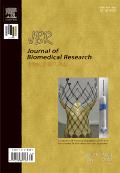
JOURNAL OF BIOMEDICAL SCIENCE
Scope & Guideline
Connecting researchers to shape the future of biomedicine.
Introduction
Aims and Scopes
- Cancer Research and Treatment:
The journal consistently publishes studies focused on cancer diagnosis, treatment methodologies, and the molecular mechanisms underlying various cancers, contributing significantly to the field of oncology. - Infectious Diseases and Antibiotic Resistance:
Research on infectious diseases, particularly concerning bacterial resistance mechanisms and case studies related to antibiotic efficacy, is a core focus, highlighting emerging challenges in public health. - Biomedical Education and Training:
The journal emphasizes educational methodologies in biomedical sciences, including innovative teaching strategies and curriculum development, aiming to enhance the competency and employability of future biomedical scientists. - Clinical Diagnostics and Biomarkers:
A significant portion of the published works explores diagnostic techniques, biomarker identification, and their clinical relevance, aiding in the advancement of personalized medicine. - Microbiology and Immunology:
The journal covers extensive research on microbiological studies and immune responses, particularly in the context of chronic infections and autoimmune diseases. - Genetics and Genomic Medicine:
There is a strong emphasis on genetic studies related to various diseases, including cancer and metabolic disorders, underlining the importance of genetic factors in disease progression and treatment.
Trending and Emerging
- Impact of COVID-19 on Health Sciences:
There is a significant increase in research related to COVID-19, including its clinical outcomes, diagnostic challenges, and the long-term implications of the pandemic on public health and medical practices. - Integration of Technology in Education:
Emerging themes in educational techniques, such as gamification and online collaborative learning, indicate a trend towards innovative teaching methods that enhance student engagement and learning outcomes in biomedical sciences. - One Health Approach:
The One Health concept, which emphasizes the interconnectedness of human, animal, and environmental health, is gaining traction, showcasing the need for interdisciplinary research in addressing global health challenges. - Personalized Medicine and Genomics:
An increasing focus on genetic variants and their implications for personalized treatment strategies in various diseases is evident, highlighting the relevance of precision medicine in modern healthcare. - Antimicrobial Resistance Studies:
Research addressing antimicrobial resistance, particularly in the context of chronic infections and treatment strategies, reflects a growing concern and urgency within the biomedical community.
Declining or Waning
- Traditional Laboratory Techniques:
There has been a reduced emphasis on conventional laboratory techniques and methodologies, as the field increasingly shifts towards automation and advanced technologies. - Basic Science without Clinical Relevance:
Papers that focus solely on basic biological science without direct clinical applications have become less common, as the journal prioritizes translational research that bridges laboratory findings with clinical practice. - Non-Communicable Diseases:
Research on non-communicable diseases, particularly in niche areas with limited clinical implications, appears to be less frequently represented in recent issues.
Similar Journals

Journal of Biomedical Research
Bridging Gaps in Biomedical Knowledge for a Healthier TomorrowJournal of Biomedical Research, published by Nanjing Medical University in China, is a prominent platform for groundbreaking discoveries in the fields of Biochemistry, Genetics, and Molecular Biology, as well as Medicine. With an ISSN of 1674-8301 and an E-ISSN of 1876-4819, the journal offers a vital opportunity for researchers, professionals, and students to disseminate insightful research findings. Although not currently available as an open access journal, its inclusion in the second quartile of both Biochemistry and Medicine categories underscores its growing influence and commitment to high-quality scholarship, as evidenced by its historical compliance with Scopus rankings prior to 2009. By fostering an interdisciplinary approach, the Journal of Biomedical Research aims to bridge gaps in current biomedical understanding and encourages innovative research that can lead to significant contributions in improving health outcomes. Its editorial policies guarantee rigorous peer review, making it a trusted source of knowledge in the biomedical community.

Cell Reports Medicine
Transforming discoveries into medical advancements for all.Cell Reports Medicine, published by Cell Press, represents a pivotal advancement in the open access landscape of biomedical research since its inception in 2020. With a dedicated focus on the intersection of medicine, biochemistry, genetics, and molecular biology, this journal has quickly established itself as a key resource, earning a remarkable Q1 ranking in these fields. Based in the United States, Cell Reports Medicine boasts impressive metrics, ranking #25 out of 636 in General Medicine and #18 out of 221 in Biochemistry, underscoring its influence and reach within the scientific community, with a notable 96th and 92nd percentile respectively. As a fully open access journal, it fosters global dissemination of knowledge, ensuring that groundbreaking research is readily available to researchers, professionals, and students alike. The journal not only promotes high-quality research but also aims to bridge the gap between molecular discoveries and clinical applications, making it an essential addition to any academic library or researcher's toolkit.

BIOMARKERS
Charting New Territories in Biomarker ScienceBIOMARKERS is a distinguished journal published by Taylor & Francis Ltd, focusing on the critical intersection of biochemistry, clinical biochemistry, and health-related toxicology. With a robust history of publication since 1996 and ongoing contributions through to 2024, the journal serves as a vital platform for researchers, professionals, and students keen on exploring innovative biomarker research that spans various domains within the life sciences. The journal is currently ranked in the Q3 quartile in key areas such as Biochemistry and Health, demonstrating its reputation in the scientific community. Although it operates under a subscription model, BIOMARKERS remains an essential resource for advancing knowledge on biomarkers in health and disease, reflecting the latest advancements and methodologies within the rapidly evolving landscape of biomedical research. Researchers looking to publish in this influential journal can expect a rigorous peer-review process aimed at ensuring the dissemination of high-quality scientific inquiry.

Genes & Diseases
Connecting genetics to disease for transformative insights.Genes & Diseases, published by KEAI PUBLISHING LTD, is a premier open-access journal dedicated to advancing the fields of genetics, biochemistry, and molecular biology. Established in 2014 and headquartered in Beijing, China, this journal has quickly risen to prominence, securing a place in the prestigious Q1 quartile in Biochemistry and Genetics (clinical), as well as Q2 in Cell Biology and Q1 in Molecular Biology as of 2023. With a commitment to disseminating cutting-edge research, Genes & Diseases serves as a critical platform for researchers, professionals, and students alike, ensuring that high-quality scientific work is openly accessible to the global community. The journal's exceptional impact is underscored by its selective Scopus rankings, which reflect its influence and relevance in key scientific domains, making it an essential resource for those exploring the intersections of genetics and disease pathology.

Biomedica
Shaping the future of healthcare with cutting-edge research.Biomedica is a distinguished journal published by the Instituto Nacional de Salud in Colombia, dedicated to advancing knowledge within the fields of biochemistry, genetics, molecular biology, and general medicine. Since its inception in 1981, this Open Access journal has embodied a commitment to disseminating high-quality research, ensuring free and universal access to its published works. With an impressive Scopus Ranking—273rd out of 636 in Medicine and 148th out of 221 in Biochemistry, Genetics and Molecular Biology—Biomedica holds a Q3 category in both disciplines as of 2023, reflecting its growing impact and relevance in the scientific community. The journal welcomes contributions that further our understanding and lead to advancements in healthcare and biological sciences, serving as a critical resource for researchers, professionals, and students alike. The journal operates within a continuous publication model from 2001 to 2024, enriching the academic landscape with contemporary findings and fostering collaboration within the biomedical field.

BRITISH JOURNAL OF BIOMEDICAL SCIENCE
Bridging Research and Practice in Biomedical ScienceBRITISH JOURNAL OF BIOMEDICAL SCIENCE is a distinguished peer-reviewed journal dedicated to publishing high-quality research in the field of biomedical science. Published by FRONTIERS MEDIA SA, this journal aims to advance knowledge in essential disciplines such as biochemistry, immunology, microbiology, and infectious diseases. Since its inception in 1993, the journal has maintained a solid reputation, achieving notable rankings across multiple Scopus categories, including Q2 in Biochemistry (medical) and Q3 in Clinical Biochemistry and Infectious Diseases. With an emphasis on open access, it facilitates the widespread dissemination of scientific knowledge, ensuring that researchers, professionals, and students can access cutting-edge studies and findings essential for driving innovation in medical and clinical practices. The journal's rigorous editorial standards and commitment to scientific excellence make it an invaluable resource for anyone looking to stay at the forefront of research in biomedical sciences.

Revista Romana de Medicina de Laborator
Unveiling the Future of Laboratory MedicineRevista Romana de Medicina de Laborator is a prominent open-access journal published by SCIENDO, dedicated to the field of medical laboratory technology and biochemistry. Since its inception, this journal has been a vital platform for disseminating research findings and advancements in laboratory medicine. With an ISSN of 1841-6624 and E-ISSN 2284-5623, it has served the academic community since 2008 and has embraced an open-access model since 2013, ensuring that valuable research is accessible to all. While it features niche rankings in Scopus for areas such as Medical Laboratory Technology and Clinical Biochemistry, it consistently strives to engage researchers, professionals, and students. Its rich collection of articles highlights innovative techniques and methodologies, supporting the ongoing development of laboratory practices. Although its coverage in Scopus has been discontinued, the journal continues to publish high-quality studies that contribute significantly to the field, fostering knowledge exchange essential for advancing medical science.

JOURNAL OF MOLECULAR MEDICINE-JMM
Championing High-Quality Research in Biomedical Science.JOURNAL OF MOLECULAR MEDICINE (JMM) is a premier publication dedicated to advancing the field of molecular medicine, encompassing critical areas such as drug discovery, genetics, and biochemistry. Published by Springer Heidelberg in Germany, this influential journal has established its significance within the academic community, achieving an impressive Q1 ranking across multiple categories as of 2023, including Drug Discovery, Clinical Genetics, and Molecular Medicine. With a focus on publishing high-quality research and novel insights, JMM appeals to a diverse audience of researchers, professionals, and students passionate about the molecular underpinnings of health and disease. The journal, which has seen a convergence of relevant research spanning from 1976 to 2024, is instrumental in showcasing groundbreaking studies that push the boundaries of knowledge in molecular therapeutics and biomedical science. While it does not offer open access, the rigor of its peer-reviewed content ensures that each publication is a valuable addition to the scientific discourse surrounding molecular medicine. For comprehensive studies and reviews that highlight the intersection of molecular biology and clinical application, look no further than JOURNAL OF MOLECULAR MEDICINE.

Biomed Research International
Connecting researchers to accelerate medical science advancements.Biomed Research International is a prominent open access journal published by HINDAWI LTD, dedicated to advancing the field of biomedical research. With its ISSN 2314-6133 and E-ISSN 2314-6141, this journal has been a significant contributor to the scientific community since its inception in 2013, making scholarly work accessible to a global audience. The journal's scope encompasses a range of disciplines, including biochemistry, genetics, molecular biology, immunology, microbiology, and medicine, reflecting its commitment to interdisciplinary research. Ranked in the Q2 quartile as of 2023 across several relevant categories, Biomed Research International is recognized for its high-quality publications that foster innovation and collaboration in biomedical studies. Researchers, professionals, and students looking to share and gain insights into cutting-edge biomedical discoveries will find this journal an essential resource. With a focus on rapid dissemination of research findings, the journal serves as a vital platform for academics to engage with contemporary issues in health and disease, ultimately contributing to the advancement of medical science.

Annals of Laboratory Medicine
Advancing the Frontiers of Laboratory MedicineAnnals of Laboratory Medicine, published by the KOREAN SOC LABORATORY MEDICINE, stands as a pivotal resource for researchers and practitioners in the fields of clinical and medical biochemistry. With a strong Q2 ranking in both Biochemistry (medical) and Clinical Biochemistry, along with a prestigious Q1 status in miscellaneous Medicine categories, this journal emphasizes the significance of laboratory medicine in improving patient outcomes and advancing scientific understanding. Established in 2012, the journal has demonstrated an impressive trajectory of growth and scholarly contribution, making it a reliable source of high-quality research and insightful reviews. The journal utilizes open access, enhancing the reach of its findings across the global scientific community. Operating from South Korea, Annals of Laboratory Medicine aims to foster dialogue and collaboration among professionals, contributing to the continuous advancement of laboratory methodologies and diagnostics.